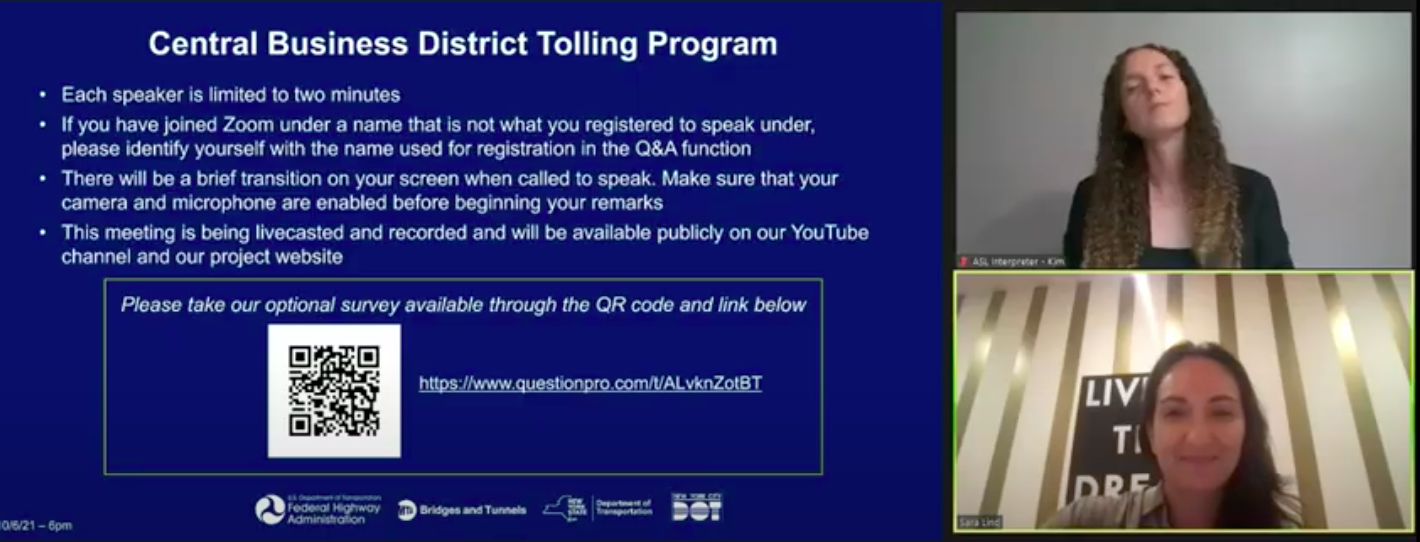On Wednesday night, the MTA held the last of 10 geographically zoned congestion pricing hearings (three additional hearings devoted to environmental justice communities kick off at 6 p.m. tonight and continue on Tuesday, Oct. 12 at 6 p.m. and conclude on Wednesday, Oct. 13 at 6 p.m.). Open Plans, the city's newly emerging civic group devoted to livable streets issues (and, full disclosure, the parent company of Streetsblog), sent four activists to testify. Here's what they said:
Lisa Orman
Chief of Strategy
I’ve worked to make the UWS, my community, a better place for walkers and bikers and am proud of what we’ve accomplished. I started this work when my now 18-year-old was born. I couldn’t imagine that I would feel comfortable having her bike to school, for instance. And I wanted her to grow up enjoying her community, her streets, her public spaces, and meeting neighbors on the street. Sadly, now, when my 16-year-old son tells me that he’s biking home from school, I notice my breath get shallow and the sweat beginning to drip. Even with all of the work we’ve done, our streets are still hostile.
Like most New Yorkers, we commute with our feet and on the train and occasionally by bike. And, let me tell you, when we commute by foot, it’s rarely without drama and fear. As New Yorkers, we come to just accept that this is life in the city. But it doesn’t need to be. The constant onslaught of noise pollution, so loud that you need to scream to have a conversation. The heart jumping terror of crossing at certain intersections. 8th graders afraid to walk to school alone. Babies killed on sidewalks.
Think about how cars and trucks limit our worlds. An urban designer named Donald Appleyard studied the connections people make on their streets. It won’t surprise many to hear that the more cars and trucks there are on a street, the fewer connections people make. Drivers literally steal our ability to connect with people.
So, when we charge people to drive through our neighborhoods, it will force them to think twice about doing so. We, the walkers and bikers, get charged just by you being on the streets. It’s only fair that you should have to pay too. Just because you don’t crash doesn’t mean you aren’t inflicting harm. This is a deeper harm, one that isn’t always seen in outward ways. But, the damage is there, and it’s time to fix that.
Please implement Congestion Pricing now, with no exemptions, and consider extending the zone to 96th Street.
That's a wrap! Over 80% of the participants were in favor of #congestionpricing, from every walk of life and every part of Manhattan. https://t.co/FBUYkDZXPB
— Open Plans (@OpenPlans) October 7, 2021
Carl Mahaney
Advocate, StreetopiaUWS
I live with my family on the west side above 60th Street. I strongly support congestion pricing. Here's why:
Cars kill cities.
They kill people through traffic violence and chronic health conditions caused by air pollution and noise.
They kill relationships, including those never formed for lack of social space to mingle.
They kill the freedom and development of children who, from the earliest age until they're almost adults, must be protected from a constant, lurking threat the moment they leave their building.
They kill the ability of our aging neighbors to participate in society, turning a simple walk to the store into a dangerous and intimidating act, resulting in fewer walks, fewer social interactions, greater isolation.
These are the social costs of driving. They're not always easy to measure, and are too often not even considered. But remember them when drivers request exemptions [from the toll].
Remember the kids living across the street from each other who never even have the chance to meet because of the stored and speeding cars keeping them apart.
Remember the grandmother living alone choosing not to leave her home because the last time she tried she was bullied by an impatient driver using her neighborhood as a shortcut to their own.
Remember the adult with chronic asthma, unable to fully participate in the activities they choose, thanks to a lifetime inhaling particulates from automobiles.
Remember the loved ones lost to the simple act of crossing the street, leaving families grieving and shattered.
Congestion pricing alone won't solve these problems... but it is an essential tool toward more livable and humane streets.
History is clear on cars and cities: they are simply not compatible.
We New Yorkers live this reality every day.
Please implement congestion pricing quickly and with no new exemptions.
Sara Lind
Director of policy
I want to start my remarks by stating clearly and unconditionally: when looking at places where congestion pricing has been implemented, there is zero evidence of drivers parking just short of the toll zone before crossing into the zone on foot or by another mode of transportation.
As a member of Community Board 7 on the Upper West Side, I’ve been part of conversations about congestion pricing and its impact on our district for years now. The idea that we will become a giant parking lot for people coming from New Jersey or Westchester has been raised countless times, and repeated by some of our elected officials as if it’s a fact. But it is not a fact. As noted before, there is zero evidence of this happening in other places that have implemented congestion pricing.
The fact is, the Upper West Side is already a giant parking lot, one where drivers circle endlessly to try to find a spot. Imagine a driver from New Jersey coming here, thinking they’re just going to park and hop on the train, and then fruitlessly searching and searching and searching for a parking spot. If they do it once, they’ll likely never do it again.
At that point, drivers will either just pay the congestion fee to park close to wherever they’re going, or the behavioral incentive will work and they’ll take public transit.
Ultimately, in fact, the impact on the Upper West Side is likely to be the opposite: fewer people driving into the congestion zone means fewer people driving through our neighborhoods. The money raised will pay for improvements to our public transportation, which will benefit the 72 percent of Upper West Siders who don’t even own a car. Many of us travel by train or bus or bike into the congestion zone regularly, and being able to move around in a city that isn’t clogged by cars, causing crashes and injuries and deaths and exhaust and illness and noise, will be so much better for all of us.
Implement congestion pricing now, with no exemptions. We can’t wait any longer.
Robert Green
Director of strategic communications
I’ve been hearing a lot of nonsense and whining the past couple of weeks in these hearings. Let’s set some things straight.
I hear about parking armageddon coming! There is no evidence this has ever happened anywhere congestion pricing has been implemented.
I hear: This is a regressive tax! No, it isn’t. The average driver is richer and whiter than the average New Yorker!
I hear: I’m an average Jersey guy, who drives into Manhattan every day! No, you aren’t. Just 1.6 percent of Jersey commuters come to the Central Business District by car.
I hear: I come to the hospitals every day! And they are all in the district! No, they aren’t. There are only two of our 10 major hospitals in the district.
I hear: I am a disability advocate! What about us? The money raised would create more accessible subways and buses, helping people like my elderly parents get into and out of public transportation. So yes, you’ve been considered!
Bikes are bad! I almost got hit by one the other day! Sorry, how is that relevant? Anyway, there have been over 2,000 people killed by cars in New York in the past 10 years, and less than 10 killed by bikes. so ... no, c’mon. Try harder.
I’m just looking out for poor people! I’m an elected! Are you? Or are you just continuing to protect your parking privilege and the city fleet of SUVs that plague our streets.
I could discourse at length about how living in a society requires shared sacrifice and each of us trying to account for our own costs we impose upon others, but instead I can sum it up by quoting the great Twitter poet Bread Fixer:
“My opinion: Congestion pricing should be applied exclusively to people who aren't me. The real problem on the streets is people who aren't me doing things that don't benefit me.”
My opinion: Congestion pricing should be applied exclusively to people who aren't me. The real problem on the streets is people who aren't me doing things that don't benefit me
— Chief ESPN Analytics Engineer🐵🚁🖍 (@bread_fixer) October 1, 2021
Pass congestion pricing. With no exemptions.







